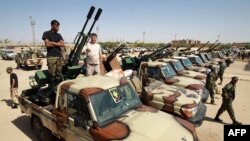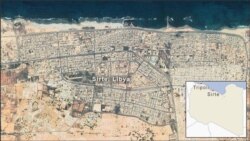The United Nations has warned of a looming risk to the lives of tens of thousands of civilians in a coastal Libyan city, calling on the United States to play a more active diplomatic role to prevent further conflict in the oil-rich country.
"There are 60,000 civilians in harm’s way in the city of Sirte right now," Stephanie T. Williams, acting special representative of the U.N. secretary-general for Libya, said Thursday.
Sirte is a strategic Libyan city along the Mediterranean Sea that the U.N.-recognized Government of National Accord (GNA), led by Prime Minister Fayez al-Sarraj, has vowed to retake from General Khalifa Haftar’s Libyan National Army (LNA).
The city has been the scene of some bloody conflicts over the past nine years. In February 2015, the Islamic State terror group seized and maintained control of Sirte for more than a year. In 2016, the GNA retook the city from the jihadists but then lost it to Haftar’s forces.
In January, Turkey began deploying troops to Libya and turned the tide of the conflict in favor of the GNA. Since then, the GNA has achieved a series of major territorial victories against the LNA and now has eyes on retaking Sirte.
“We want to really spare Sirte and its people from further trauma,” Williams said during a webinar hosted by the Arab Center in Washington, D.C.
‘Regional escalation’
In recent days, the risk of the Libyan crisis turning into a regional conflict has reportedly increased with neighboring Egypt threatening to use military force to prevent the GNA from crossing a “redline” by pushing to retake Sirte.
Egypt, along with the United Arab Emirates, Saudi Arabia and Russia, backs the eastern-based LNA. Europe is divided on the conflict, with France also on the side of the LNA.
Turkey and France have, in recent days, traded harsh words over Libya. On Monday, French President Emmanuel Macron accused Turkey of playing a “dangerous game,” prompting a response from Turkish Foreign Minister Mevlut Cavusoglu accusing France of attempting to restore old “colonial rule” over Libya.
The U.S. has largely remained on the sidelines over the fate of the war-torn African nation, according to experts.
On Thursday, the U.N. envoy said it was time for the U.S. to take a more active diplomatic role.
"Libyans, it's not a secret, are desperate for U.S. role: a small investment on the part of the U.S., and particularly in this need to herd the cats internationally,” Williams said. She added the situation had deteriorated to a point in which she was “genuinely worried about regional escalation and miscalculation.”
Experts say Egypt, under President Abdel-Fattah el-Sissi, views the Islamist-rooted GNA as being part of the global Muslim Brotherhood movement, an organization designated as a terrorist group in the country.
Egyptian cease-fire
“Egypt is sending messages to Turkey, and it's sending messages to the GNA that Egypt will not allow itself to be humiliated by a move all the way to the eastern border,” Jonathan M. Winer, former U.S. special envoy for Libya, said, adding that Egypt had “legitimate” security concerns near its eastern border.
Earlier this month, the GNA rejected an Egypt-proposed cease-fire with the LNA. But following the recent Egyptian threats, the GNA appears more reluctant to retake Sirte.
On Thursday, Turkey said the withdrawal of the LNA from Sirte was a precondition for the GNA to accept a cease-fire with the militia group that has established its own House of Representatives in the eastern city of Tobruk, according to the Turkish media.
Earlier this a month, the U.N. reported the discovery of at least eight mass graves in the Libyan city of Tarhuna shortly after the GNA retook it from Haftar’s forces. The U.N. also reported an increase in the number of civilian casualties in recent months. Since April, it has documented at least 250 civilian casualties, including 82 deaths.
“I think [the U.S.] should look at now what is happening and realizing that security of the southern Mediterranean is at risk, and that has all sort of implications for U.S. national security. I hope that the call is heard,” Williams said.








